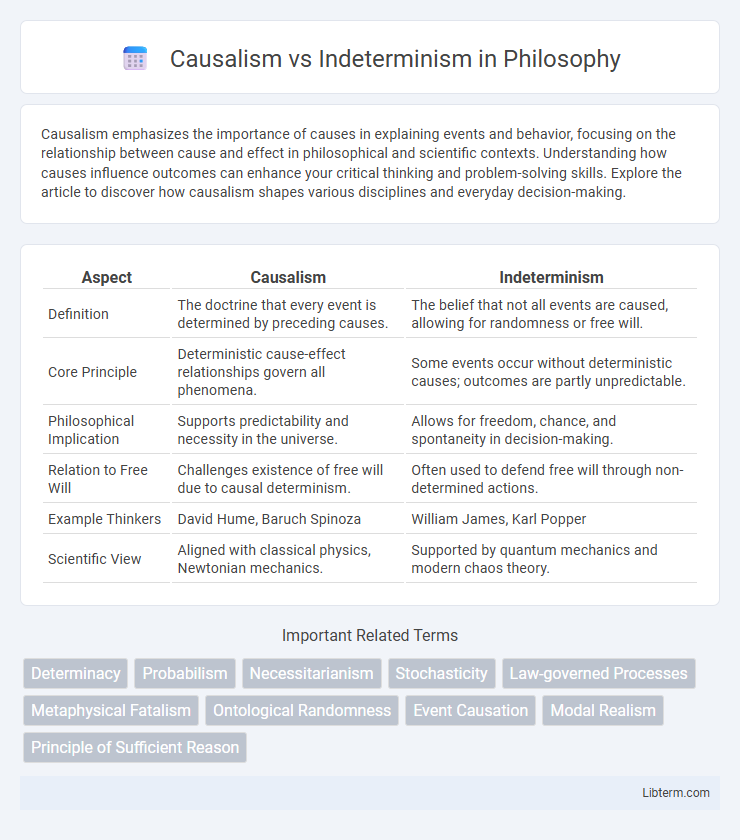Causalism emphasizes the importance of causes in explaining events and behavior, focusing on the relationship between cause and effect in philosophical and scientific contexts. Understanding how causes influence outcomes can enhance your critical thinking and problem-solving skills. Explore the article to discover how causalism shapes various disciplines and everyday decision-making.
Table of Comparison
| Aspect | Causalism | Indeterminism |
|---|---|---|
| Definition | The doctrine that every event is determined by preceding causes. | The belief that not all events are caused, allowing for randomness or free will. |
| Core Principle | Deterministic cause-effect relationships govern all phenomena. | Some events occur without deterministic causes; outcomes are partly unpredictable. |
| Philosophical Implication | Supports predictability and necessity in the universe. | Allows for freedom, chance, and spontaneity in decision-making. |
| Relation to Free Will | Challenges existence of free will due to causal determinism. | Often used to defend free will through non-determined actions. |
| Example Thinkers | David Hume, Baruch Spinoza | William James, Karl Popper |
| Scientific View | Aligned with classical physics, Newtonian mechanics. | Supported by quantum mechanics and modern chaos theory. |
Introduction to Causalism and Indeterminism
Causalism is the philosophical doctrine asserting that every event or state is the consequence of preceding causes, emphasizing determinism and predictability in natural phenomena. Indeterminism, by contrast, holds that not all events are causally determined, allowing for randomness, chance, or inherent unpredictability within physical or metaphysical systems. These opposing views shape fundamental debates in metaphysics, physics, and philosophy of science concerning the nature of causality and free will.
Defining Causalism: The Principle of Cause and Effect
Causalism centers on the principle of cause and effect, asserting that every event or state is the result of preceding causes in a deterministic chain. This philosophical doctrine emphasizes that all phenomena are explainable through identifiable antecedent conditions, supporting predictability and order in natural laws. Contrasted with Indeterminism, which allows for randomness or inherent unpredictability, Causalism upholds a structured framework where causality governs the unfolding of events.
Understanding Indeterminism: The Role of Chance and Uncertainty
Indeterminism asserts that not all events are causally determined, emphasizing the role of chance and inherent uncertainty in the unfolding of phenomena. Quantum mechanics and probabilistic models provide scientific frameworks supporting indeterminism by demonstrating outcomes that cannot be precisely predicted despite known initial conditions. This perspective challenges classical causalism by highlighting the limits of cause-and-effect relationships and introducing unpredictability as a fundamental aspect of reality.
Historical Roots of the Debate
The historical roots of the debate between causalism and indeterminism trace back to ancient philosophical inquiries into determinism and free will, prominently discussed by Aristotle and later expanded by Enlightenment thinkers such as Hume and Kant. Causalism, grounded in the principle of sufficient reason, argues that every event has a cause, reflecting deterministic philosophies deeply embedded in Newtonian physics. Indeterminism emerged as a counterpoint, gaining scientific support from developments in quantum mechanics, which challenged the notion of predictable causality by introducing probabilistic elements into the understanding of physical phenomena.
Causalism in Classical Physics
Causalism in Classical Physics asserts that every event or state is determined by preceding events according to strict cause-and-effect relationships, ensuring predictability and determinism. This principle underpins Newtonian mechanics, where forces and motions can be precisely calculated, reflecting an orderly, law-governed universe. Indeterminism challenges this by introducing randomness or unpredictability, which classical physics traditionally rejects in favor of deterministic causality.
Indeterminism in Quantum Mechanics
Indeterminism in quantum mechanics asserts that physical systems do not have predetermined states prior to measurement, emphasizing inherent randomness in particle behavior. Unlike causality-based classical mechanics, quantum indeterminism is mathematically represented by probability amplitudes governed by the Schrodinger equation and wavefunction collapse. This fundamental unpredictability challenges deterministic views underpinning causalism and supports interpretations like the Copenhagen interpretation and many-worlds theory.
Philosophical Implications of Causalism
Causalism asserts that every event is determined by preceding causes, reinforcing a deterministic worldview that challenges notions of free will and moral responsibility. This perspective implies that human actions and decisions are ultimately predictable outcomes of prior states, impacting debates on accountability and ethical theory. Philosophically, causalism raises critical questions about the nature of agency and the possibility of genuine choice in a causally closed universe.
Free Will: A Battleground for Causalism vs Indeterminism
Free will remains a pivotal battleground between Causalism and Indeterminism, where Causalism asserts that every decision arises from preceding causes governed by deterministic laws, while Indeterminism champions randomness and quantum uncertainty as essential for genuine freedom. Causalists argue that predictability and causality underpin moral responsibility, whereas Indeterminists claim that uncaused choices preserve autonomy beyond mechanistic constraints. This philosophical clash impacts debates in neuroscience, ethics, and metaphysics, challenging the very foundation of human agency and accountability.
Modern Scientific Perspectives
Modern scientific perspectives on causalism emphasize deterministic frameworks where cause-and-effect relationships govern physical phenomena, exemplified by classical mechanics and certain interpretations of quantum theory. Indeterminism, highlighted in quantum mechanics through concepts like wave function collapse and intrinsic randomness, challenges strict causality by introducing probabilistic outcomes that cannot be precisely predicted. Contemporary research explores the reconciliation of causal determinism with indeterministic events, investigating how underlying causal structures coexist with probabilistic behaviors in complex systems.
Conclusion: Future Directions in the Causalism vs Indeterminism Debate
Future research in the Causalism vs Indeterminism debate should prioritize integrating advancements in quantum mechanics with classical causal theories to refine the understanding of deterministic and probabilistic processes. Emphasizing interdisciplinary approaches involving physics, philosophy, and cognitive science can provide nuanced insights into the nature of causality and randomness. Enhanced computational models and empirical studies are essential for resolving ongoing tensions between strict causal determinism and inherent indeterminacy.
Causalism Infographic

 libterm.com
libterm.com